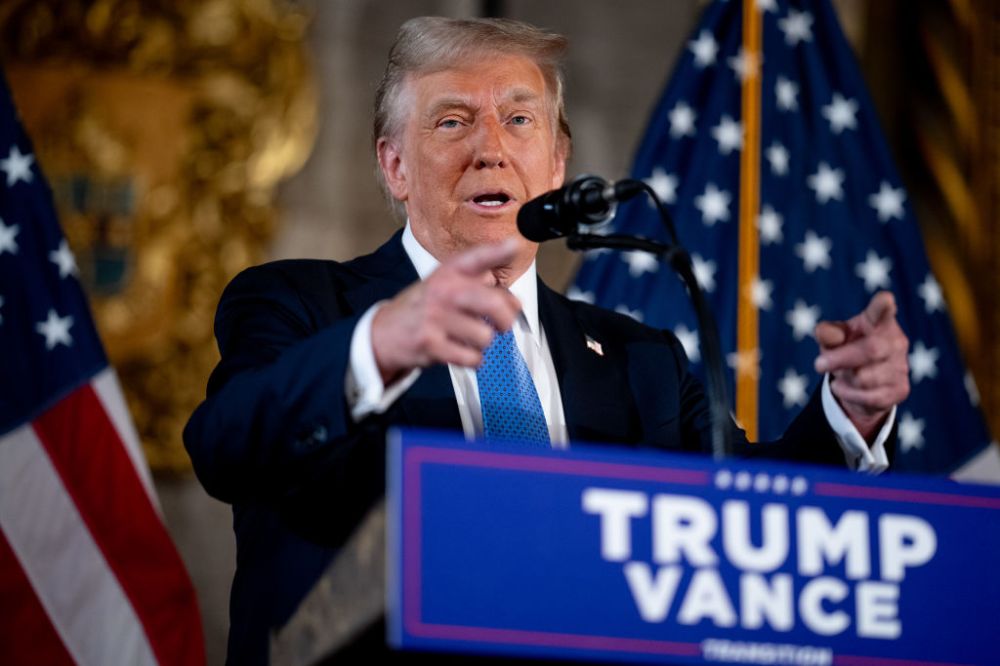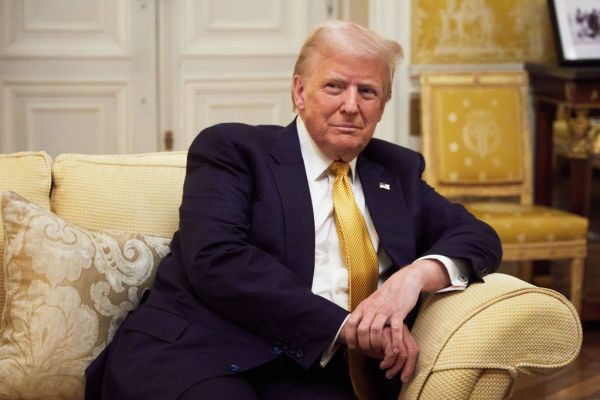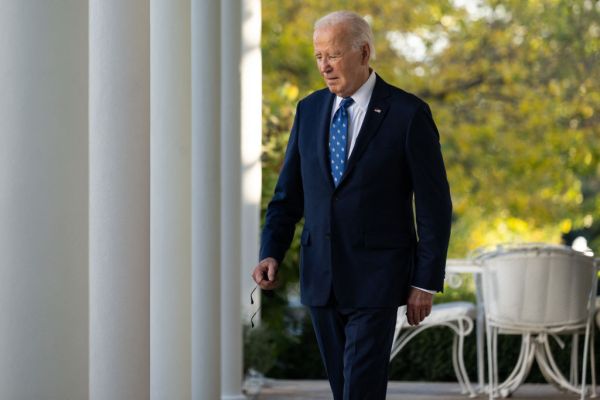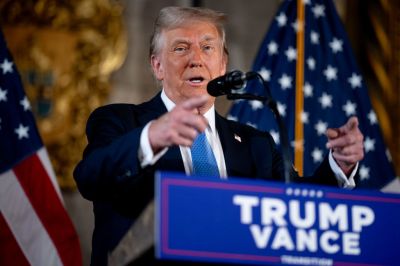I’ve never felt prouder to work for The Dispatch than I did when I read Sarah Isgur’s op-ed for the New York Times last week.
It takes real nerve to dare the loathsome flunky who’s about to take over the FBI to come at me, bro in the pages of America’s most prominent newspaper.
Sarah was Jeff Sessions’ communications chief at the Justice Department when he served as attorney general. For reasons no one except Kash Patel understands, her name appears in the alphabetized list of “deep state” enemies featured in his book, Government Gangsters. That makes her a ripe candidate for a preemptive pardon by the Biden administration as it heads for the exits.
No thanks, Sarah wrote. The innocent shouldn’t desire a pardon and the guilty don’t deserve one. “You’ve got a case? Prove it,” she concluded, addressing Patel directly.
That’s the right attitude, all the more admirable by contrast with how pathetically pardon-curious some prominent Trump enemies have sounded when the subject has come up. I wouldn’t want clemency either if I were in Sarah’s position, although in my case that has less to do with thoughtful rationales like protecting my good name or trusting the justice system than with basic contempt. I’m a creature of spite; I’d never forgive myself for giving postliberal scumbags the satisfaction of seeing me beg for mercy.
As much as I enjoyed her op-ed, though, I wonder if it wasn’t naive.
When you’re a brilliant Harvard-trained lawyer with lots of brilliant lawyer friends, you can afford to be bolder in challenging Patel to legal combat than if you’re some shlubby midlevel Biden aide with no relevant training whose scalp Donald Trump might like to display. As Sarah observed elsewhere recently, the process itself will be the punishment when Patel’s FBI begins harassing people. Defending oneself successfully from an abusive prosecution isn’t much of a victory if it ends with bankruptcy.
Trump enemies who can fight without ruining themselves in the process should resolve to do so. Trump enemies who can’t should think hard this next month about accepting a pardon.
Sarah anticipated that response, though. “As Americans start to see his lack of evidence, Mr. Patel will look ridiculous,” she insisted in her Times piece. “If anything, he may end up making heroes out of his targets, who would, in turn, be able to raise money for the exorbitant cost of their legal defense from outraged Americans until judges would predictably throw out these frivolous cases.”
“Outraged Americans,” huh?
There will be some outrage, I’m sure, on behalf of sympathetic A-tier Trump antagonists who’ve paid a professional price already for trying to hold him accountable. The Liz Cheney Legal Defense Fund will probably do well. But if last month’s election result means anything, it’s that Americans ultimately don’t care—much—about Trump’s illiberal outrages. They’re willing to accept them as a trade-off if he can make the trains run on time.
A lot of very powerful people seem to have reached the same conclusion. The behavior of corporate America toward Trump this past week can be understood as a product of two beliefs. One: Under the new administration, the U.S. government will function like a protection racket. Threats will be the currency of politics. Either you pay for the president’s “protection” or you get squeezed.
Two: As this unfolds, most Americans won’t care a bit.
Shakedowns.
I asked some Trump-supporting relatives recently how they’d feel if Hunter Biden announced the opening of a new Biden family business in the heart of downtown Tehran, Iran. That would be a brazen case of a foreign power purchasing influence over U.S. policy by lining the pockets of the first family, the core Republican complaint about Hunter’s dubious “career,” no?
Well, that’s what the Saudis are doing with the Trumps. And what they’ve been doing with the Trumps for a while now.
It’s unknown which side proposed building a new Trump Tower in Riyadh but I know which way I’d bet. Saudi Arabia is a monarchy so its rulers understand what monarchs expect. King Donald didn’t need to request a real estate opportunity, in all probability; it was offered to him by Mohammed bin Salman as a form of tribute, a token of esteem for America’s continued “friendship.” The Saudis have no intention of getting squeezed.
Corporate America has also begun to pay tribute. Various tech titans and/or their CEOs have chipped in million-dollar donations recently to Trump’s inaugural committee and these too were probably offered without anyone on the committee needing to ask. That’s how protection works: When everyone else is paying up “voluntarily,” the last thing you want is to attract the attention of the goons who run the neighborhood by dragging your feet. You’ll get squeezed.
The buzziest story in the media industry this week has to do with ABC News getting squeezed.
Last weekend the outlet opted to pay $15 million to settle a defamation suit brought by Trump. The claim stems from George Stephanopoulos alleging on-air that Trump had been found civilly liable for rape by a New York jury, which was untrue. The jury found him liable for sexual abuse. Still, ABC News had a solid defense: The judge in the case also used the word “rape” to describe what happened and under First Amendment case law a public figure as famous and sleazy as Trump is nearly libel-proof.
Even so, not only did ABC News not press on with its defense, it threw in the towel at an unusually early stage of defamation litigation, before seeking summary judgment.
Maybe discovery would have exposed the outlet as having been so wildly malicious in wanting to accuse Trump of “rape” that settling the case was the least embarrassing option available. But the almost certain truth, as Jonathan Last and others have noted, is that ABC News—and its parent company, Disney—made a rational calculation that it had more to lose financially by making enemies of the neighborhood goons than it did by paying them off.
The same goes for Amazon god-emperor Jeff Bezos, a donor to the Trump inaugural fund who had an epiphany that newspaper endorsements are bad barely a week before Election Day, coincidentally while his own paper was drafting an endorsement of Kamala Harris. Likewise for biomedical entrepreneur Patrick Soon-Shiong, the owner of the Los Angeles Times, who installed Trump apologist Scott Jennings on his paper’s editorial board last month and has begun meddling with the opinion section to go easier on you-know-who.
If ABC News, the Washington Post, or the Los Angeles Times make trouble for the neighborhood goons, the goons aren’t just going to make trouble for those companies. They’re going to make trouble for Disney, Amazon, or Soon-Shiong’s holdings, respectively, where the owners make their real money. “It’s particularly notable that this is happening in the case of news organizations whose owners have other businesses,” Anne Applebaum told The New Republic of the protection racket playing out before our eyes. “They have other businesses; they have lots of interests with the federal government; they have regulatory issues. And it looks like they’re making concessions in advance so that they don’t run into trouble down the line.”
A news industry owned and operated by oligarchs is easy pickings for an unscrupulous authoritarian because those oligarchs have many points of financial vulnerability. Trump doesn’t need to hurdle ABC News’ First Amendment rights in order to win his suit when he can sidestep those rights by squeezing Disney instead.
The squeeze is about more than extracting tribute, though.
Quiescence.
“We have to straighten out the press,” Trump said at a news conference on Monday, announcing his intention to sue pollster J. Ann Selzer over a bad pre-election poll published in the Des Moines Register.
He says a lot of things that he doesn’t mean, but this time he meant it. Later that day he filed suit in Iowa against Selzer, the Register, and, notably, the newspaper’s parent company, Gannett, alleging fraud and “brazen election interference” under the state’s Consumer Fraud Act. He ended up winning Iowa by 13 points, mind you, and might plausibly have benefited on Election Day from Selzer’s data showing an upset victory for Kamala Harris in the making there. After all, if any local Republicans were inclined to stay home in the belief that Trump had it in the bag, the survey would have given them a reason to turn out.
I assume he’ll lose the lawsuit, barring shocking evidence of intentional reputation-destroying malfeasance by Selzer. He might not even get a payoff from Gannett this time like he got from ABC News. But that’s not the point of suing, surely: The point is to show the news industry that he can and will put the squeeze on outlets that displease him in his second term. Even if Iowa had a law on the books that allowed a judge to toss his suit as frivolous—which it does not, apparently—the message has been sent by going after Selzer and Gannett that as president he intends to harass media properties that aggrieve him whether they’re guilty of anything unlawful or not.
Historically he’s tried to deter the media from publishing information that’s inconvenient to him by raising the reputational cost of doing so. When Lesley Stahl once asked him why he attacks the press so often, he supposedly replied with stark authoritarian candor, “I do it to discredit you all and demean you all so when you write negative stories about me, no one will believe you.” His decade-long project of celebrating outré populist right-wing media while deriding mainstream outlets is designed to convince Americans that there’s no difference between the unfriendly New York Times and the very friendly Infowars and therefore no reason to trust the former more than the latter.
But increasingly the cost he hopes to impose on his enemies to compel their silence is financial. At his press conference he boasted about the number of defamation complaints he has pending against media entities, naming CBS News, Bob Woodward, and the board that awards the Pulitzer Prize specifically. In this as in so many other things, his favorite cronies are following his lead: Patel recently threatened to sue former Trump aide turned critic Olivia Troye for defamation, and an attorney for Pete Hegseth, Trump’s nominee to lead the defense department, vowed to sue the woman who accused Hegseth of sexual assault in 2017 if she repeats her “false statements,” i.e. allegations.
Threats are the political currency of Trump’s second term. Protection rackets and defamation lawsuits won’t always result in a lucrative shakedown but they will always signal to his opponents, especially but not exclusively in the press, that speaking out will cost them one way or another. They might get sued civilly or, as of January 20, prosecuted. (“I shouldn’t really be the one to do it,” Trump said at his press conference of the defamation suits he’s filed. “It should have been the Justice Department or somebody else.”) The process is the punishment, as Sarah said. That’s what the American people signed up for when they handed the immense power of the federal government to a vindictive postliberal buffoon.
“Trump has reached the position—elected by a plurality of his fellow citizens, immunized from all criminal activity by the Supreme Court—where he wants the protection racket to be out in the open. He wants everyone to see it,” Jonathan Last wrote recently. That’s almost precisely correct: The court hasn’t immunized him from “all criminal activity” but certainly the squeeze works more efficiently when everyone in the neighborhood understands what’s expected of them and what will happen if they don’t meet expectations. If you’re going to rough someone up for missing a payment you do it in the street, in full public view, so that onlookers get the message.
Trump won’t turn the entirety of American media into Fox News by threatening it, but if you have a chance to bet on which newspapers are most likely to expose the major scandals of his second term, don’t wager too much on the Washington Post or Los Angeles Times. It might not be long, in fact, until an economist somewhere releases a study showing that the new White House’s protectionist agenda is a disaster in the making—and finds himself hauled into civil court for “fraud” because of it.
Indifference.
Last believes that Bezos and the other oligarchs are rolling over so easily because they know they’ll have to endure this for only four years.
At the risk of imputing my own opinions to them, I wonder if it isn’t the opposite. Having just watched their country reelect a convicted felon and coup-plotter, the titans of industry may have come to a hard conclusion about Americans’ tolerance for gangster government being much higher than they had assumed.
Most voters don’t care whether their government is postliberal, we’ve learned, they care about the price of groceries and securing the border. There’s no obvious reason to think those priorities will shift after Trump departs. The “ancien régime that is liberalism is really exhausted,” Trumpy tech lord Peter Thiel declared recently. Kamala Harris’ deputy campaign manager added a gloss to the point, telling Semafor that the “institutions by which Democrats have historically had the ability to influence culture are losing relevance.” The swing voters who’ll decide America’s future aren’t reading the Times, they’re listening to alarmist mutterings about drones over New Jersey that may or may not actually exist. That’ll almost certainly still be true when the next president takes office in 2029.
Good businessmen are quick to adapt when the rules of the system in which they operate suddenly change. On November 5, the rules of American government changed. Corporate America is adapting.
Their capitulation this week reflects the belief, correctly I think, that the public won’t rally behind them if they stand up to Trump. There aren’t enough “outraged Americans” left, to borrow Sarah’s phrase, to give Disney confidence that it can win a PR war with the White House if it goes to the mat for ABC News’ First Amendment rights. (Case in point: The right’s many media watchdogs and “free-speech” advocates appear completely unbothered by Trump’s attempts to strong-arm the press, unsurprisingly.) For cripes sake, while all of this has been playing out, his favorability rating is higher than it’s ever been.
American institutions might not fill the vacuum left by the public’s dereliction of civic duty either. The courts that Sarah so often celebrates may have ultimately found for ABC News if Trump’s lawsuit had proceeded, but at what price to the defendants in time, legal expenses, harassment by the incoming Justice Department, and unwanted public attention from the rabidly demagogic president of the United States?
I mean, American institutions had four years to punish Trump for attempting a coup and stealing government secrets and they couldn’t do that. If you’re Jeff Bezos, fighting the Trump administration in court looks like a sucker’s game of spending four years getting nowhere while antagonizing every cronyist regulator in the federal government.
Institutions might protect dissenters from legal penalties but they won’t spare them from the social, political, and commercial sanctions Trump intends to impose on them. Only the people can deter him from that and the people palpably don’t care. He’s the first president in American history to have campaigned overtly on retribution against his enemies and not only did he win more electoral votes this time than he did in 2016, he won the popular vote outright.
Threats are the political currency of his second term. Voters had every reason to know that would be the case last month and they punched his ticket anyway. Hate Jeff Bezos and Patrick Soon-Shiong if you like, but don’t fault them for responding rationally to the civic incentives that a rotten public has created for them. No one wants to get squeezed.







Please note that we at The Dispatch hold ourselves, our work, and our commenters to a higher standard than other places on the internet. We welcome comments that foster genuine debate or discussion—including comments critical of us or our work—but responses that include ad hominem attacks on fellow Dispatch members or are intended to stoke fear and anger may be moderated.
With your membership, you only have the ability to comment on The Morning Dispatch articles. Consider upgrading to join the conversation everywhere.